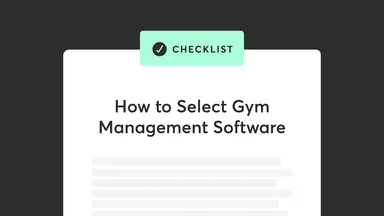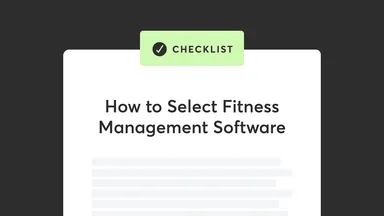
Should I Lease Fitness Equipment or Buy It?
January 10, 2025
You can't have a fitness studio or gym without equipment, but one question many owners face is whether they should buy or lease fitness equipment. If you're just getting started, you may only have the finances available to purchase second-hand equipment, but if that equipment wears down quickly, replacing it will be costly. If you're expanding your business, you may want to make equipment updates to increase your curb appeal and keep current members happy.
So, how will you pay for these upgrades? There are affordable options to both lease and buy fitness equipment. Read on to see which option is best for you.
Leasing fitness equipment
Leasing fitness equipment is like paying rent. You apply for the lease through a lender or finance company. They purchase the equipment, and you use it during the terms of the lease, as if you own it, while making monthly payments that include built-in interest and fees. At the end of the lease, you can choose to renew, return the equipment, or opt for purchasing the equipment at a reduced price.
If you're planning to update your equipment frequently, leasing may be the best option. In addition, some larger pieces of gym equipment—treadmills, ellipticals, and bikes need regular maintenance. With a lease, you aren't responsible for fixing or replacing damaged equipment. A lease option is typically less than an initial payment on a loan, and you can update your equipment every year if you like. While this keeps cash in your business, it also has the added benefit of providing the most up-to-date equipment options for your community.
There are tax advantages to leasing, too. The Tax Cuts and Jobs Act, passed in December 2017, made lease payments 100% tax-deductible for businesses, with no limit. This means that after deducting the monthly payment from your revenue, you’ll lower your taxable income. Learn about 10 common tax deductions for fitness businesses.
However, when you lease, you don't own the equipment. If you need to regain any costs, you won't be able to sell your inventory. You probably won’t be able to claim the equipment as assets on your balance sheet, either—although some lease agreements allow equipment to be recognized as assets.
If you do decide a lease is the right fit for your business, you'll need to stay on a regular maintenance schedule and keep the equipment clean and damage-free. If you don’t comply with the terms of your lease, you’ll face fines or penalties.
So if you decide to lease, be sure to carefully review the details and fine print of your agreement.
Buying fitness equipment
While leasing may work for some, there are benefits to purchasing your own equipment. If you plan to use your equipment for years at a time, and don’t think you’ll need to update regularly, you may find buying its the best option.
Some benefits of buying your own equipment:
- It provides an asset
- You can sell it to offset upgrade costs
- You can customize equipment you own
Yet many small business owners don't have the capital on hand to pay cash up front. Another option is to buy the equipment with an equipment loan.
The U.S. Small Business Administration offers the 7(a) Loan Program, which provides an affordable form of financing. These are government-backed loans available at moderate interest rates. They're available through a wide range of banks, but the application process can take five days to two months or more. Additionally, there are a number of commercial loans that offer short- and long-term options that can help in the purchase of your big-ticket items.
Consider your current and future equipment needs—and how they might evolve with your business. Buying equipment is a big investment, so do your research and really think about where you see your business years down the road.
Equipping an existing business
If you're investing in new equipment for an existing business, first clarify your vision so you have clear expectations for how your investment will positively impact your business.
Next, understand your utilization rate. If your most popular classes and time slots are full and waitlists are common, additional fitness equipment can help optimize your revenue. If you're planning to expand your offerings, consider leasing new equipment so you can try it out before investing completely. Another option—buy some pieces of equipment and lease others.
The decision to buy or lease may feel daunting. But by carefully considering all your available options, you’ll find an approach that makes sense for your business at any stage of growth.



